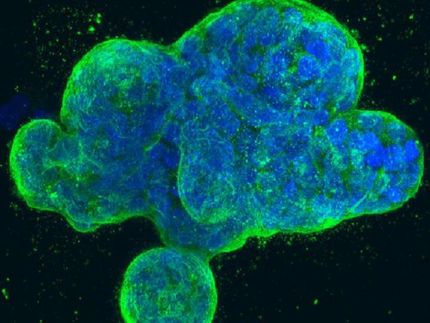High-sensitivity bone marrow aspiration technology enhances leukemia cell detection
Advertisement
Scientists have created a viable technology to improve the detection of leukemia cells in bone marrow. Superconducting Quantum Interference Device (SQUID) enhanced the ability to rapidly quantify the amount of nanoparticle bound tumor cells in a sample at least 10 fold, and increased sensitivity of minimal residual disease measurements. Results of this proof-of-concept study are published in Cancer Research.
"This promises to significantly enhance the detection for residual disease in leukemia and other cancers," said lead scientist Richard S. Larson, M.D., Ph.D., vice president for translation research at the University of New Mexico Health Science Center. "Coupling nanotechnology can be employed in common techniques to enhance its utility."
These findings are a result of a collaborative research effort between Senior Scientific, LLC, and the University of New Mexico. The study was funded by a small business innovation grant awarded by the National Cancer Institute.
Previous studies have indicated that the magnetic needle can collect approximately 80 percent of leukemia cells in a bone marrow sample in a matter of minutes, according to Edward R. Flynn, Ph.D., president and CEO of Senior Scientific, LLC.
The scientists developed this magnetic marrow biopsy needle in an effort to target tumor cells with nanoparticles and then preferentially extract the tumor cells with a magnetic needle. They used anti-CD34 antibody loaded magnetic nanoparticles to detect CD34+ cells as an indicator of leukemia. To quantify the cells recovered, they coupled this nanoparticle-mediated fishing for leukemic cells with SQUID.
SQUID enhanced the sensitivity of measuring minimal residual disease over standard pathology methods for patients undergoing chemotherapy. "This result will determine more precisely the effect of the chemotherapy and will help to ascertain proper dosage or termination of treatment for patients," said Flynn.
Furthermore, Larson said that SQUID will work well with current technologies to improve the detection of leukemia cells in the bone marrow. Chi Van Dang, M.D., Ph.D., professor of medicine, cell biology, oncology and pathology, and vice dean for research at the Johns Hopkins University School of Medicine, believes this approach is quite different from the current standard. He suggested that the sensitivity compared to polymerase chain reaction still needs to be determined.
"In the case of leukemias without clear genetic markers, the magnetic needle could be useful," said Dang, who was not associated with this study, but is an editorial board member for Cancer Research . "It is possible that this technology could be used to detect cancer stem cells in general, if the proper antibodies with appropriate specificity are available."
Other news from the department science
Most read news
More news from our other portals
See the theme worlds for related content
Topic world Antibodies
Antibodies are specialized molecules of our immune system that can specifically recognize and neutralize pathogens or foreign substances. Antibody research in biotech and pharma has recognized this natural defense potential and is working intensively to make it therapeutically useful. From monoclonal antibodies used against cancer or autoimmune diseases to antibody-drug conjugates that specifically transport drugs to disease cells - the possibilities are enormous

Topic world Antibodies
Antibodies are specialized molecules of our immune system that can specifically recognize and neutralize pathogens or foreign substances. Antibody research in biotech and pharma has recognized this natural defense potential and is working intensively to make it therapeutically useful. From monoclonal antibodies used against cancer or autoimmune diseases to antibody-drug conjugates that specifically transport drugs to disease cells - the possibilities are enormous


























































